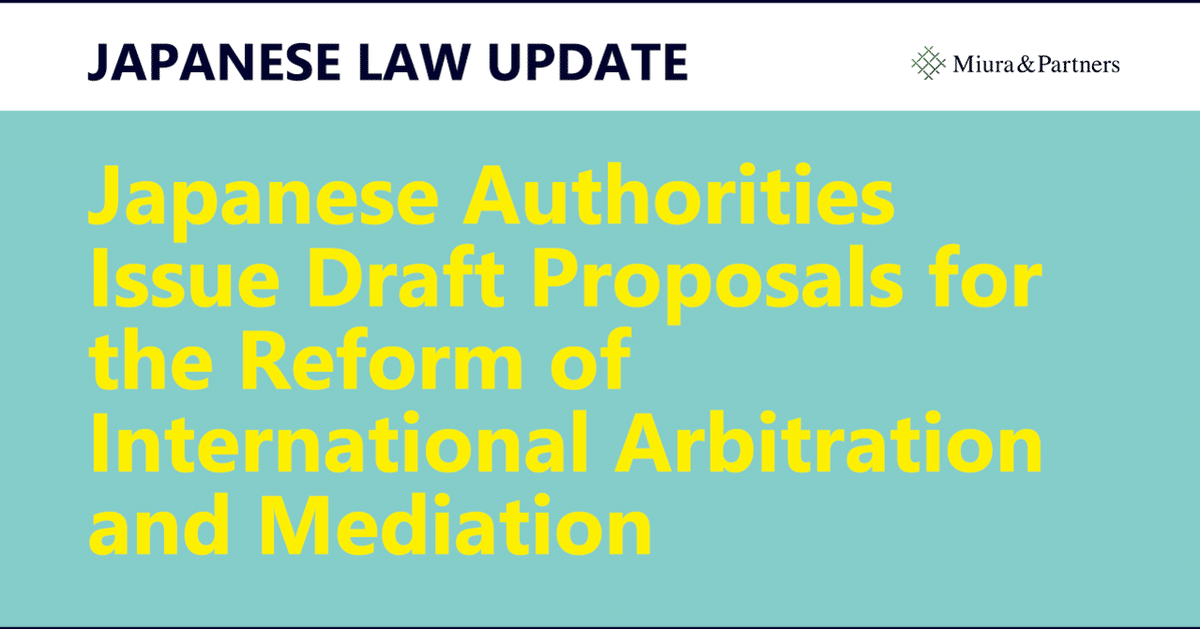
Japanese Law UPDATE #1: Japanese Authorities Issue Draft Proposals for the Reform of International Arbitration and Mediation
On March 5, 2021, the Committee on the Reform of International Arbitration in Japan issued their interim draft proposals for reforms to the Arbitration Act of Japan and other related laws (the “Draft Notes”). The committee is an advisory body for the Japanese Ministry of Justice, and its recommendations are highly influential in the legal reform process.
The Draft Notes will soon be open to public comment. This reform on the Arbitration Act of Japan and other related laws aligns with other government initiatives to elevate the status of Japan as a forum for settling international commercial disputes.
In 2003, the Arbitration Act of Japan implemented the UNCITRAL Model Law on International Commercial Arbitration (1985) (the “UNCITRAL Model Law (1985)”). Soon after, however, UNCITRAL updated the model law, which became the UNCITRAL Model Law on International Commercial Arbitration (2006) (the “UNCITRAL Model Law (2006)”). The recommended reform of the Arbitration Act of Japan is a long-awaited response to this institutional change, and will be the first large scale amendment to the Arbitration Act of Japan since it came into force. In the Draft Notes, the committee suggests implementation of the new rules set in the UNCITRAL Model Law (2006).
Below is a list of what the current and potential users of international arbitration and mediation should be aware of in the new proposals.
1. Recognition and Enforcement of Interim Measures and Provisional Orders by an Arbitral Tribunal
Under the current Arbitration Act of Japan, the Japanese court does not recognize or enforce interim measures or provisional orders issued by an arbitral tribunal. Therefore, a party in arbitration who applies for an interim measure or provisional order in Japan must rely on voluntary compliance by the other party.
The Draft Notes recommend that the reform of the Arbitration Act of Japan include new provisions under which the Japanese court shall recognize and enforce interim measures and provisional orders issued by an arbitral tribunal. This proposal is in line with Article 17 of the UNCITRAL Model Law (2006). If this proposal is reflected in the new Arbitration Act of Japan, a more effective and expeditious remedy will be available for claimants seeking temporary injunctive relief (e.g. to protect confidential information) or security for damages (e.g. freezing assets) during the process of arbitration.
2. Accepting an Award or Evidence in Other Languages without Japanese Translation before a Japanese court
The Japanese court does not accept any written submission or documentary evidence in foreign languages unless a party provides its Japanese translation. To enforce an arbitral award at a Japanese court, the claimant who received the award needs to prepare the Japanese translation of the entire award. This requirement deviates from the standard practice in international arbitration, where the award is often written in English. Therefore, it has been seen an obstacle for Japanese courts to support a quick enforcement of an award.
The Draft Notes suggest that Japanese courts should have the discretion not to require the Japanese translation of the arbitral award or documentary evidence written in languages other than Japanese. This reform will make the enforcement process before Japanese courts more expedient and cost effective.
3. Responding to the Singapore Convention on Mediation
Domestic mediation involving a national court has been used as a means for settling commercial disputes in Japan. A settlement agreement made in mediation with the involvement of a national court is enforceable, but a settlement agreement made in mediation without the involvement of a national court is not.
With the arrival of the Singapore Convention on Mediation (the “Singapore Convention”) which came into force in 2020, international mediation as a means for dispute resolution has attracted attention in Japan as well. While Japan is not a signatory of the Convention as of today, the Draft Notes acknowledge the significance of the Singapore Convention as a response to the recent developments in international mediation. The Draft Notes suggest that the upcoming reform include a mechanism to recognize and enforce a settlement agreement made in the process of mediation.
Since this is a new mechanism under Japanese law, the Draft Notes propose a couple of options regarding the scope of the provision; specifically whether it should be limited to settlement agreements made in international mediation, or should cover settlement agreements made in both international and domestic mediation.
The Draft Notes will be open to public comment, upon which the committee will continue its debates.
Author
Yoshie Midorikawa, Partner
Yoshie Midorikawa has extensive experience in complex disputes and arbitration under the rules of the ICC, SIAC, UNCITRAL, LCIA, and ICSID. Having worked with leading law firms in Japan and Singapore, she has handled parallel proceedings across multiple jurisdictions as well as domestic disputes before Japanese courts. Through learning in the United States, practicing in Singapore, and serving on an international law firm’s arbitration team, among other accomplishments, she has developed expertise operating in diverse international environments. She has also served as a board member of listed companies in Japan, improving their corporate governance. Her deep understanding of the civil law system, her working experience in international environments, including common law jurisdictions, and her knowledge of business, enable her to bring practical and nuanced legal solutions to international commercial disputes. She is listed among “Best Lawyers in Japan 2021(Litigation)” by Best Lawyers.
